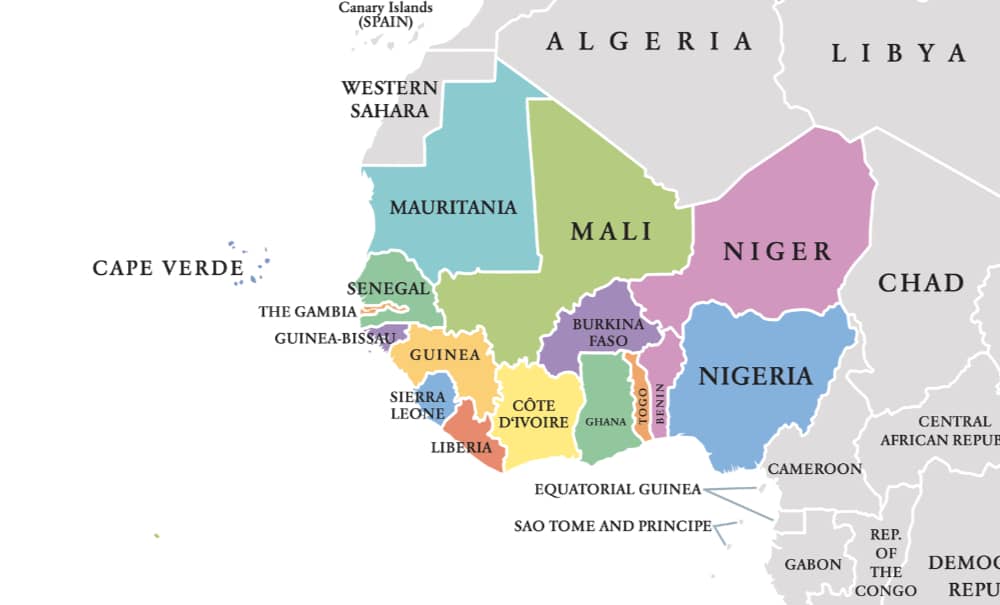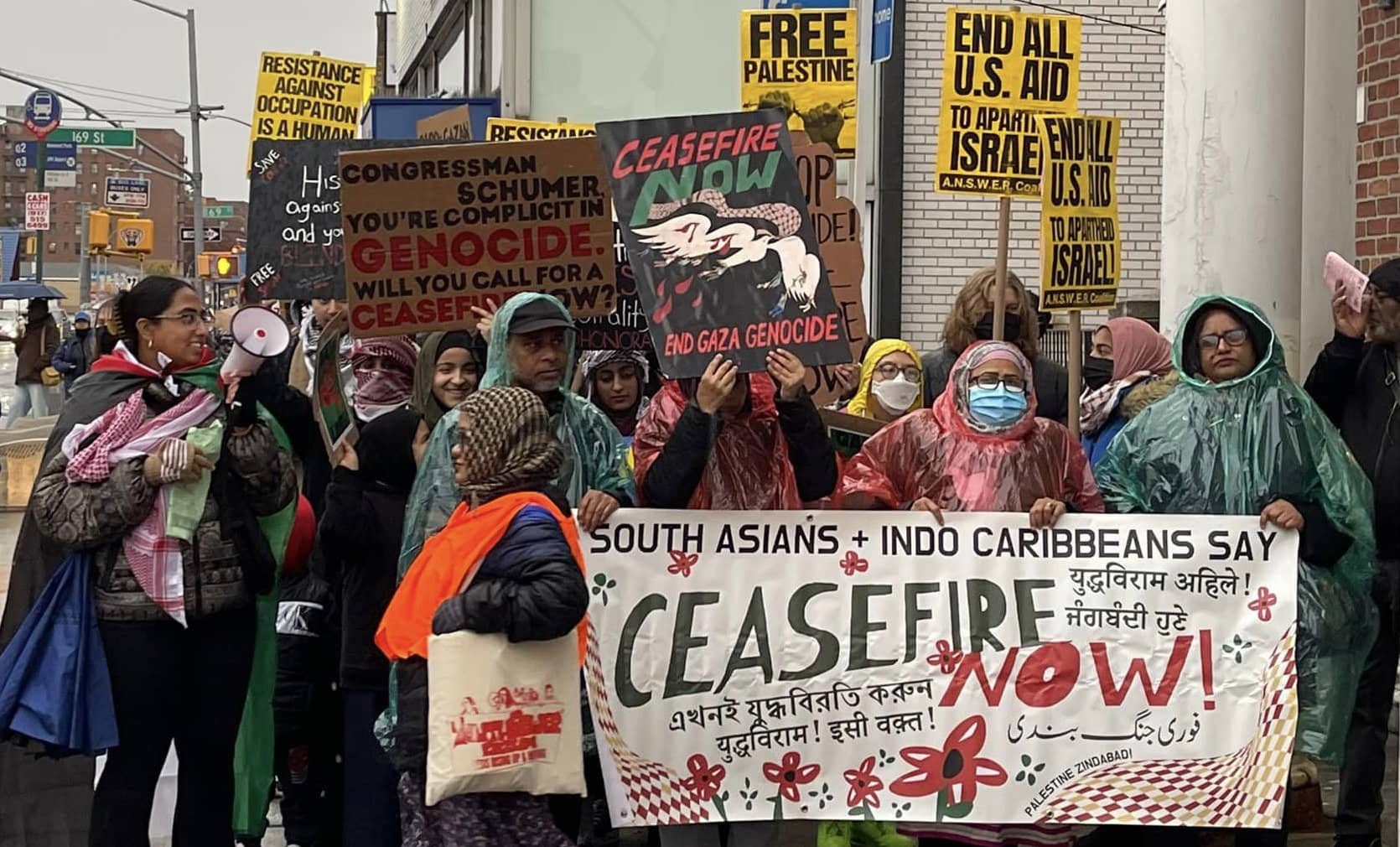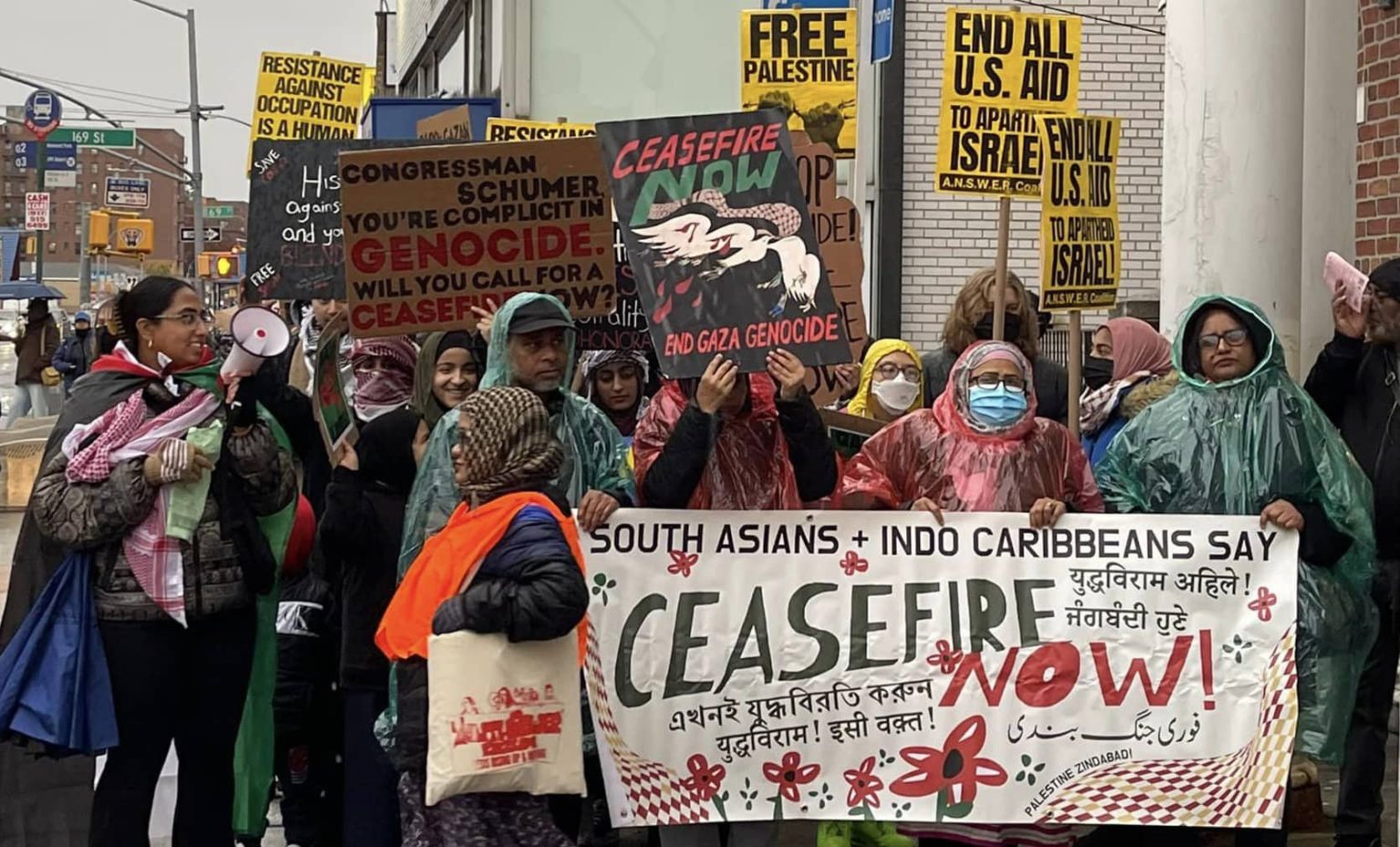
Dear friends,
Spring is official, and we welcome our readers to the early bloom of change in the neighborhood. And in this sacred month of Ramadan celebrated by so many here in Jackson Heights, we wish you extra time for reflection, community, and connection.
Our first story also brings news of change: the shifting landscape of global migration behind an increasing number of West African immigrants arriving in New York City. We then turn to report on the largely invisible stories of Palestinian Americans in Gaza and the West Bank during a relentless war, and the obstacles to immigration even for close family members of Palestinian US citizens.
Newsletter highlights:
- Troubled routes for West African migrants
- Stranded and besieged: Palestinian Americans in the Occupied Territories
1. West Africa to NYC
“We always heard when you come here, you’re going to find two jobs, you’re going to work, you’re going to survive. But when you come here, it’s hard to even find one job. It’s a fiction, what we heard.” —Ibrahim Mbengue, recent Senegalese immigrant
Embodying the shifting currents of global migration, hundreds of thousands of West Africans, mostly young men, have been arriving at the US-Mexico border over the last few years, with tens of thousands ultimately making their way to New York City. In fiscal year 2023 alone, 58,000 Africans crossed into the US from Mexico, three times as many as the year before. At the end of 2023, about 14% of the people in New York’s migrant shelters came from Senegal, Guinea, and Mauritania, countries on the Atlantic coast embroiled in social conflict and economic crisis. Like other migrants, West Africans leave home for a range of reasons, fleeing organized violence, repression, discrimination, domestic abuse, climate change, and lack of economic opportunity. But their pathways of migration, and their experiences in New York, are unique.
West Africa is much closer to Europe than to the US. But EU nations, with the cooperation of the Moroccan navy, have progressively hardened their borders, effectively discouraging West Africans from crossing the Mediterranean. At the same time, a new, circuitous route from Africa to North America has opened up. In what some commentators call a “weaponization of migration” intended to respond to US sanctions, the government of Nicaragua is providing unrestricted low-cost visas to African migrants. Flying into Nicaragua with legal status can be used as a stepping stone towards the US. In West African countries, ads for “travel packages” to Nicaragua are prominently featured on TikTok and other social media. Brokers buy up large numbers of airline tickets and resell them to migrants at a profit.
A series of flights from West Africa to Nicaragua is expensive, often costing $10,000 or more. Migrants often rely on loans from family members. The trip is also arduous. It typically begins by flying to international airline hubs like Istanbul, where migrants board the sold-out daily flight to Bogotá, Colombia. From there, they struggle to catch a connecting flight to San Salvador, and then another to Managua. Travelers often get stuck in the crowded Bogotá airport for days as they attempt to arrange the next leg of their journey.
In Managua, migrant travelers meet up with guides and make their way north by foot, bus, and train through Central America and Mexico to the US border. By starting out in Nicaragua, African migrants have a head start: they avoid the dangers of the infamous Darien Gap, which lies further south between Colombia and Panama. Yet the trek north is still extremely perilous. Like other migrants, Africans may be preyed on by dishonest smugglers, officials, police, and gangs; they are sometimes subjected to violence or robbed of their possessions. After reaching the US border and requesting asylum, migrants undergo Border Patrol and ICE processing. The US government has found it difficult to deport Africans because of distance, and lack of bilateral agreements with the countries of origin. Most West African migrants are allowed to travel to a US city of their choice while their asylum court dates are pending.
Although a few African immigrants have come to New York on Texas Governor Greg Abbott’s infamous buses, most arrange their own transportation from the border. On arrival, they face daunting challenges. Mayor Adams has imposed a thirty-day limit on shelter stays for single migrants, including young people. Within the shelters, lack of translation resources has prevented some West African migrants—who may speak French, Arabic, Pulaar, or Portuguese—from accessing basic services or assistance with their asylum cases.
Once pushed out of the shelter system, New York’s African immigrants often struggle to find housing, food, and other necessities. Many are living in makeshift circumstances—in basements, crowded informal shelters, on the sidewalk, in the subway, or in ad hoc spaces provided by non-profits and religious groups. Usually, the community groups willing to provide emergency shelter are ineligible for government aid, since they don’t meet the required fire and building regulations.
A network of some 20 small mosques distributed around the five boroughs has found its open-hearted generosity overwhelmed by the needs of newly arrived West African Muslims. Community organizations like Black Alliance for Just Immigration (BAJI), African Communities Together (ACT), and the mutual aid group Black and Arab Migrant Solidarity Alliance (BAMSA), are also swamped by the sudden demand for food and health care, ESL classes, housing and legal assistance. The Interfaith Center of New York (ICNY) is currently spending $22,000 to cater halal meals for 100 people at the neediest mosques across the city during the days of Ramadan.
Like other new arrivals, African migrants want above all to work. Lacking official permits, many have turned to day labor, street vending, and food delivery—including work for the major delivery app companies, using “shared” ID documents. These labor pools are already crowded and competitive. Nevertheless, many Africans go to great lengths to not just survive but send a few dollars back home.
A wide spectrum of community organizations and liberal politicians has called on the Biden administration to extend Temporary Protected Status (TPS) to African and Caribbean migrants who face unsafe conditions in their countries of origin. This would reduce fear of deportation and provide access to legal employment. So far, the administration has not agreed.
“By not taking action to address the specific barriers that Black immigrants face when seeking immigration relief, the administration is not only upholding the inequities that exist throughout many of the programs, but championing the continued silence around the experiences of the country’s fastest-growing immigrant population.” —Diana Konaté, Policy Director, African Communities Together
WHAT CAN WE DO?
- If you can, donate to the groups linked to above that support West African migrants.
- Urge Chuck Schumer to get the Biden administration to authorize TPS for West Africans.
2. Abandoning Palestinian Americans in Gaza
“And so … you see the same pattern over and over and over again. The State Department says something very basic and generic, and then they don’t do anything about it, and they wait for the story to fade away. And that sends the message to Israel: You can do whatever you want, even to American citizens, and no one will hold you accountable.” – Edward Ahmed Mitchell, civil rights attorney and national deputy director of CAIR (Council on American-Islamic Relations), 2/14/24
The recent killing, arrests, and attacks on US citizens in Gaza and the West Bank are stories barely told in mainstream US media, or told only to soon “fade away.” Here are just a few. Samahar Esmail, from Louisiana, forcibly taken from her West Bank home in early February and detained without charges. Palestinian American teenager Mohammad Ahmed Mohammad Khdour, 17, shot in the head by Israeli forces on February 10 while sitting in a parked car with his relative near the West Bank town of Biddu. Borak Alagha, 18, and his brother Hashem, 20, both born in Chicago where they spent their early childhood, arrested on February 8 and now held in an Israeli prison.
Around 350 US citizens remained trapped in Gaza as of December 2023, with another 600 legal permanent residents or immediate family members of US citizens—eligible to come to the US—also unable to depart. That same month, two Palestinian American families sued the Biden Administration for failing to protect US citizens in a war zone, and denying their constitutional right to equal protection. (In early October as the war began, the US government chartered flights and a cruise ship to Europe for US nationals in Israel.)
Project Immigration Justice for Palestinians (Project IJP) was launched as an emergency response to the crisis in Gaza. The coalition of US immigration lawyers and justice organizations advocates for humanitarian immigration options for Palestinians, and offers legal services to US families with relatives in Gaza. The lack of accessible pathways to immigration for Palestinians is mobilizing an urgent fight for expanded eligibility criteria for who can get State Department assistance in leaving Gaza. Currently, even green card holders cannot bring their parents to the US. Aunts, uncles, nieces and nephews, and siblings who are married or over the age of 21 are also excluded. In other words, most family members of US Palestinians are not eligible for immigration even if they are facing starvation and a genocidal war. The one available immigration portal created for situations of humanitarian crisis, called humanitarian parole, usually takes years to process. It also requires paperwork—birth certificates, passports, identity documents—that for most Gazans have been destroyed in the bombing of their homes, buried under rubble, or left behind as they flee their homes.
A lawyer with Project IJP explains: “Without the government coming out and saying that [they] are going to prioritize processing applications from Palestinians in Gaza, there’s no guarantee that any of our efforts will come to anything.”
We shine this brief spotlight on Palestinian Americans not because their stories are more important than others in Palestine, but because their situation reveals the brazen complicity of the US with Israel in devaluing Palestinian life and freedom—even for American citizens.
WHAT CAN WE DO?
- You can connect with Project IJP if you are a lawyer and want to volunteer. You can also reach out if you have family members in Gaza.
- View or share Project IJP’s webinar that offers guidance re: immigration justice for Palestinians.
In solidarity and with collective care,
Jackson Heights Immigrant Solidarity Network (JHISN)
Follow @JHSolidarity on Facebook and Twitter and share this newsletter with friends, families, neighbors, networks, and colleagues so they can subscribe and receive news from JHISN.

